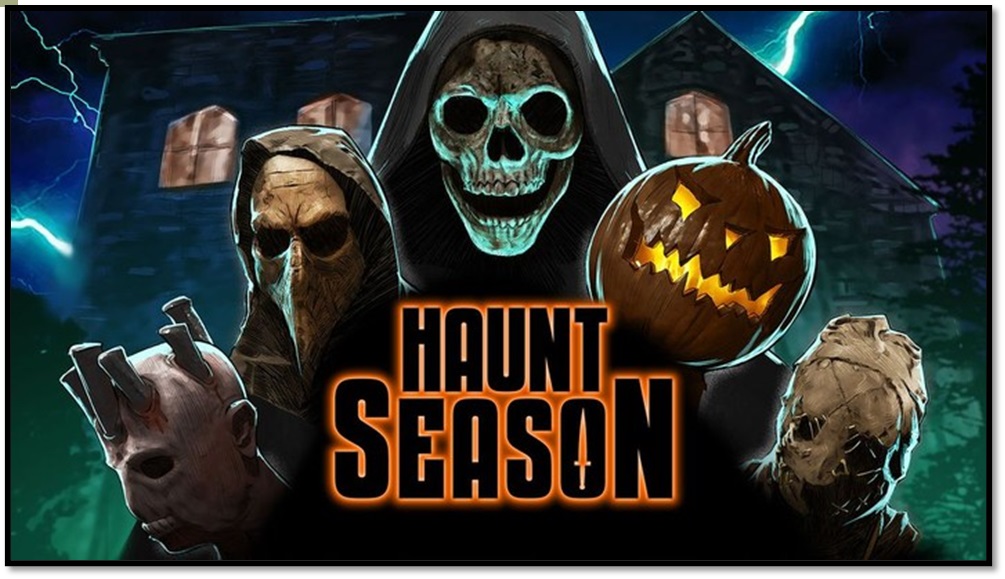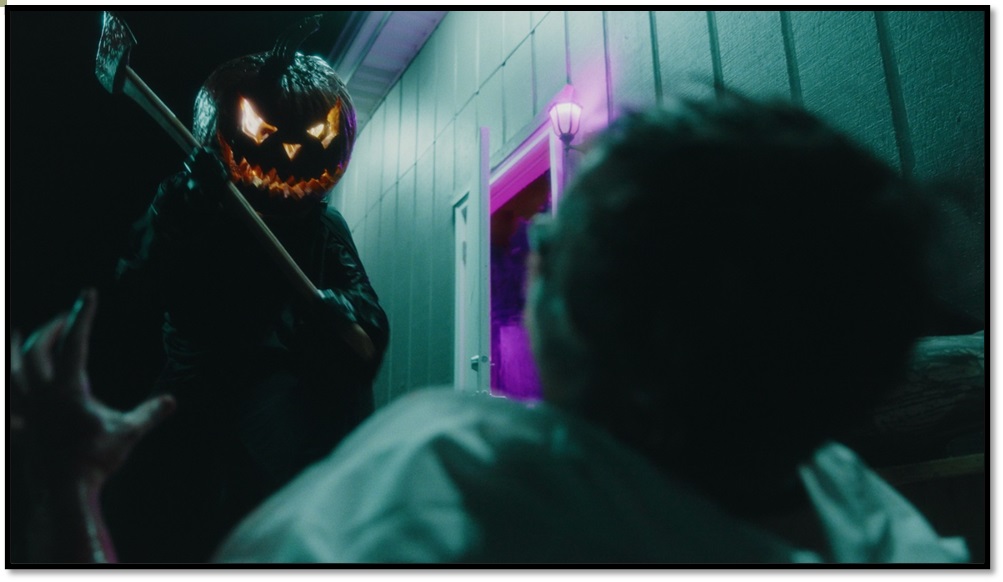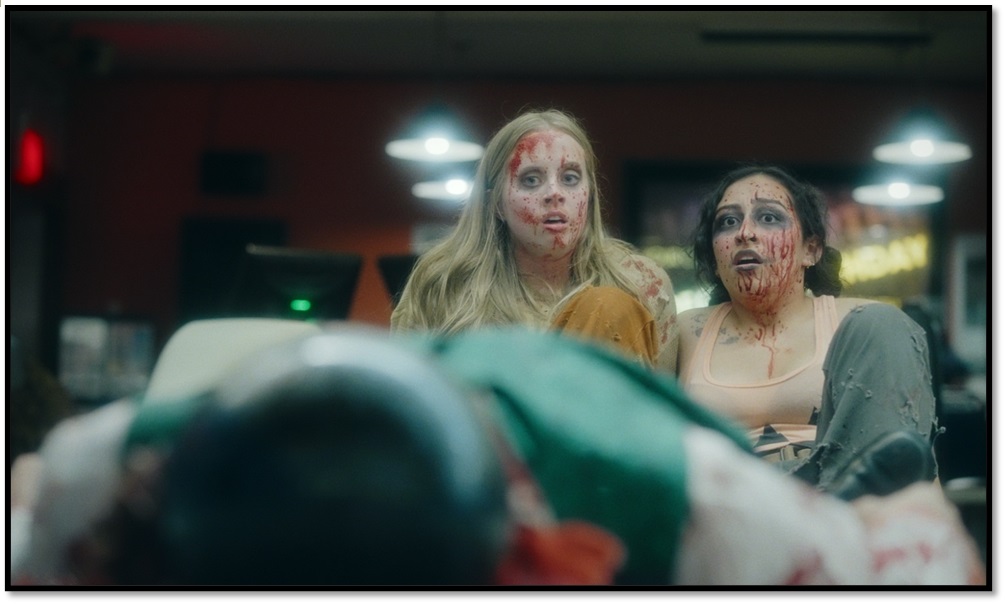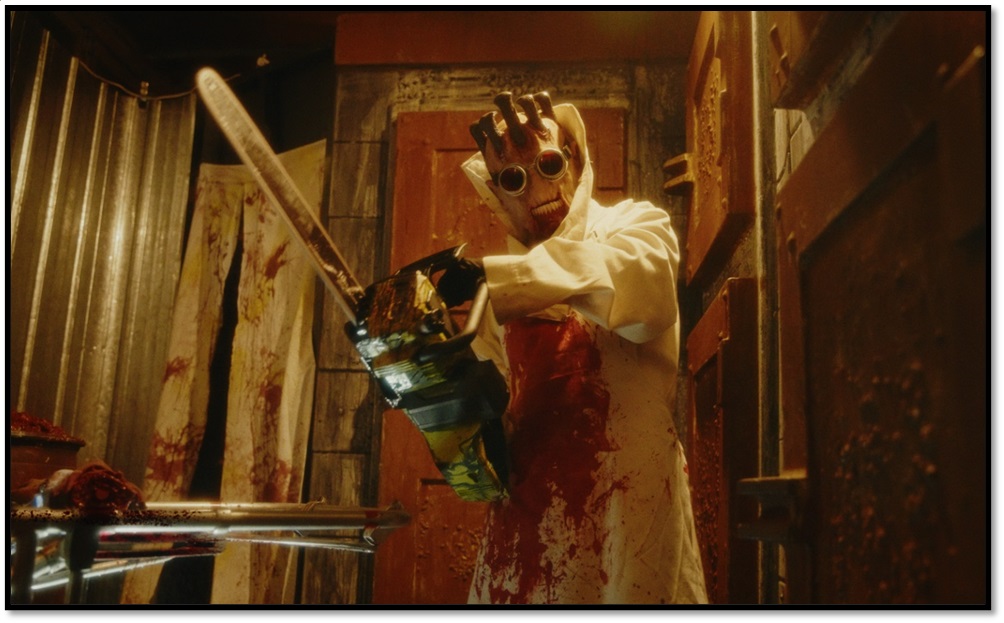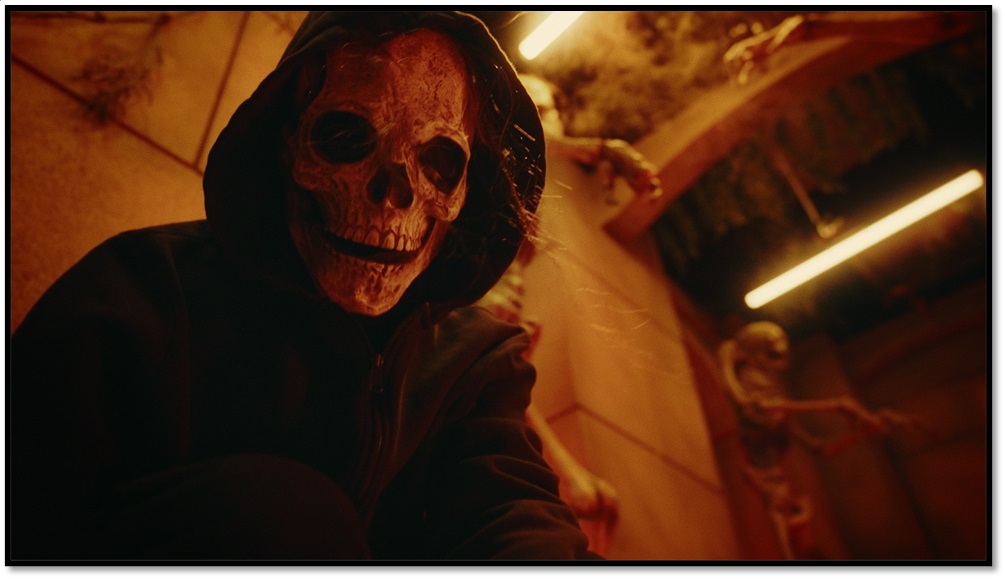Goth Chick News: 13 Questions for Filmmaker Jake Jarvi
If you check in here often, you know the only thing we love more than a blended adult beverage is an independent film. This one, entitled Haunt Season, came to me by way of the local paper and combines a whole lot of my favorite things: haunted attractions, Halloween, and horror, with the added bonus of being a very local endeavor.
To get you warmed up, check out the trailer…
According to the Shaw Local News Network:
Haunt Season was created by Lake Bluff (Illinois) native and Gurnee resident Jake Jarvi for Epic Pictures Group and is mainly filmed at the local haunted house attraction “Realm of Terror” in Round Lake Beach, with some scenes filmed in Oakwood Hills. The slasher film follows a recent theater graduate Matilda (played by local actress Sarah Elizabeth) as she works a new job as a scare actor at a haunted house attraction when a masked serial killer starts to pick off the crew one by one. The horror movie reads like a love letter to Halloween and gives an authentic-feeling look into the lives of people who work in haunted houses.
I had to know more and reached out to Jarvi to see if he would be willing to share this process with GCN along with some pics from the film. He graciously agreed.
So, everyone meet Jake.
Jake, meet everyone.
GCN: What was your career journey into filmmaking?
JJ: Ever since I was a kid, I thought movies were the coolest thing ever. I made rip-off movies from the time I was 9, making home grown versions of Back to the Future with a time traveling couch and Home Alone, cleverly disguised under the title Get That Kid. When YouTube was invented myself, my wife, and my friends made a super powers web series called Platoon of Power Squadron and through the YouTube-following of one of our cast members, a vlogger called WheezyWaiter, we grew a pretty loyal audience over 8 years.
When we decided to finally try this for real by making a horror movie, the audience we’d built over all that time were generous enough to invest in the film and we finally made the project that got US and international distribution.
What was your inspiration for Haunt Season and how did you land on Realm of Terror as the setting for your film?
The location was actually the inspiration. Stephen Kristof, the owner of Realm of Terror, let us use his haunted house to film some comedic heavy metal music videos. After one of the shoots, we got to talking about movies and he suggested we make one at his haunt. I’d seen enough of the haunted house horror movies to know what had been done in that sub-subgenre before and I wrote a slasher. Our twist was that we focused mainly on the lives of the haunt actors and the world of part-time entertainers rather than the guests visiting the haunted house.
Were there any particular filmmakers or films that influenced you?
I’m very influenced by the works of the team of Adam Wingard and Simon Barrett. Particularly the movies The Guest and You’re Next. They’re the best at nodding to genre and having fun without turning the movies into actual spoofs. And the whole body of Wes Craven’s work, his Nightmare on Elm Street flicks and the Scream franchise is my absolute favorite. Haunt Season is much more indebted to the chatty teen slashers of the ’90s than anything else.
How involved were you in every stage of production, from writing to post-production? Were there any aspects you found more challenging than expected?
I wrote the script, directed the movie, edited it, and produced it every step of the way alongside other producers Eliza Toser, Stephen Kristof, and Jeremy Warner. It was a much bigger project than we’d ever tackled before so everything was more challenging. Working with professional camera, lighting, and sound teams instead of YouTube friends was very very new and required a lot more care in terms of learning to delegate. I wanted the movie to feel much larger than its budget and, in terms of the sheer amount of people involved, it was much more complicated than anything we’d put together before.
How did you approach financing the film? Did you encounter any difficulties raising funds for the project?
I didn’t want to Kickstart or Indiegogo another project. We did that a lot on the web series and the essential “donation” aspect of it always bugged me. I found Wefunder, which is a crowdsourcing site that creates a space for actual investing. There’s SO MUCH MORE paperwork than the “donation” model sites because you’re creating an actual business that people are investing in with an actual stake in the movie.
The films that raise their money through Wefunder use a Revenue Share contract where the investor, in success, will earn 120% back on their initial investment before the production company (us) sees any profit. Once the 120% is reached investors and the production company split the proceeds 50/50.
We raised $107,000 there and our success on that platform brought a few private investors our way as well to get us to our full final budget. I wasn’t sure how it would go, but we maxxed out our Wefunder take in 11 days and went into full pre-production mode right away.
How did you manage your budget for this film, and what strategies did you use to maximize limited resources?
We budgeted as we would for our tiny tiny webseries and then tripled our estimates in every category. It turns out that was lowballing it. Luckily, my very adept production manager Eliza Toser built a little budgetary cushion around us. Even then, we weren’t prepared for the approximately $10,000 in costs it takes to deliver a finished film to a distributor, so we had to take out an additional loan to deliver the movie to our domestic and international distributors.
How did you handle the casting and hiring process with a limited budget? Did you work with volunteers or non-union actors and crew?
Many of our cast were non-union, but the unions ultra low budget agreement stipulates that if you have any union actors even your non-union actors get the union rates and contracts. Our whole crew was non-union and we were very lucky that they liked our script enough to sign on at very reduced rates. The talent-to-budget ratio on this movie is absolutely wild.
Did you face any obstacles distributing the film as an independent creator? How did you approach getting it in front of audiences?
We lucked into it. When the movie was finished, our producer Jeremy Warner showed it to a team he’d previously worked with who’d just sold a movie to Hulu. It turns out they also acted as producers’ reps. They liked our poster and our trailer, checked out the movie, and said they’d be interested in repping us. They reworked our trailer with a very talented trailer company called Acrolight, built a package, and shopped us to distributors.
It was SOOOOOOOOO helpful. They guided us every step of the way and we learned so much about contracts and delivery and expectations and communication. I didn’t even know producers’ reps existed before. They’re great. But what I also learned here is that the poster and trailer are so incredibly important. If you can make those two things look like something that can make money in a segment of the marketplace, people will help you for a percentage of that money.
Can you share any memorable behind-the-scenes stories from your time filming Haunt Season?
Wow, boy howdy. We did. There’s a playlist on my YouTube channel of 32 videos chronicling the entire process from the day we announced the fundraiser through to the movie being released on all the rental platforms. That playlist is five and a half hours long. We’ve got 330ish minutes of BTS stories on Haunt Season talking about how a truly indie production really happened to us.
How do you market an independent film differently from a major studio release? What strategies have you found most effective?
Marketing a movie is so different then working in YouTube. All of YouTube is about driving traffic to the one video on that one channel. It’s done through being an active part of communities and constantly following and interacting with those communities organically. Commenting on the work of others, building relationships, collabing, constantly uploading new and interesting things.
Movie marketing is about blasting everything out to as many outlets as you can interest all at once. The trailer was hosted everywhere to anyone who would have it. Because the movie doesn’t exist in a single space on a single channel. It’s on every retailer and you are just trying to drive basic awareness in a crowded marketplace however you can.
Our PR team Teamclick who work with our distributor Epic/Dread was absolutely incredible. I loved taking part in Zoom press junkets with Yinterviewers and writers all over all over the horror space. The only thing that’s the same in both spaces is what my friend/YouTube Boss Rob Scallon calls creating the door. The thumbnail and title on YouTube are the trailer and poster in the film marketplace. They HAVE TO make somebody stop scrolling and click. You have to show someone a door that they want to open. It’s all we’ve got.
What advice would you give to aspiring independent filmmakers who are just starting out and want to make their first film?
The way the current marketplace is, everyone will tell you to find some name talent. So great. Easiest thing in the world. Since people just starting out don’t often have access to name talent, the only real advice I have for folks is to find the top place where their true and natural interests overlap with a voracious marketplace.
For me, it was horror. I love horror movies so it was natural to make one using everything I’ve always wanted to put into a horror movie. If you’re just trying to make something you think “you’ll be able to sell” but you’re not interested in the actual thing you’re making, the audience for that thing can tell. And it sucks. Wherever your real interests overlap with an audience that will pay for things, that’s what you should focus on making.
Looking back on the entire process, what’s the most important lesson you’ve learned as an independent filmmaker?
You have to find people who want to make the same thing as you. If you and various crew members are pulling in too many different directions, you’re going to waste so much time. You need to know what people want out of the process and establish communication that ends up with everyone having a great experience. It’s the only way to work in a low budget space.
What’s next for you and for Haunt Season?
I don’t know. We’re on all the streaming VOD retailers, AppleTv, Prime, Googleplay, FandangoNow/VUDU, YouTube, Xbox DirectTV, DishNetwork, all the places. When our rental and purchase windows lapse we’ll go out to the advertising-supported streamers like Tubi and Fawsome and all the places. I’d love it if we got a Blu-ray. I really don’t know. But I’m excited to find out.
Thanks Jake! I watched Haunt Season on Amazon Prime and it was even more fun knowing some of the back story. A definite add to Spooky Season.
